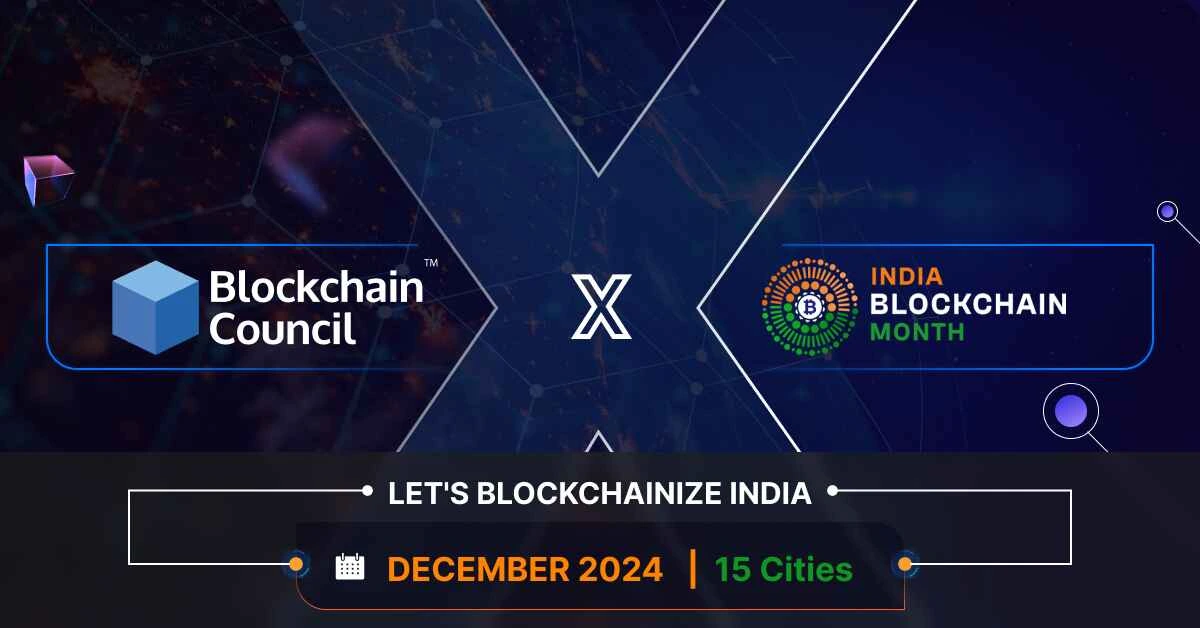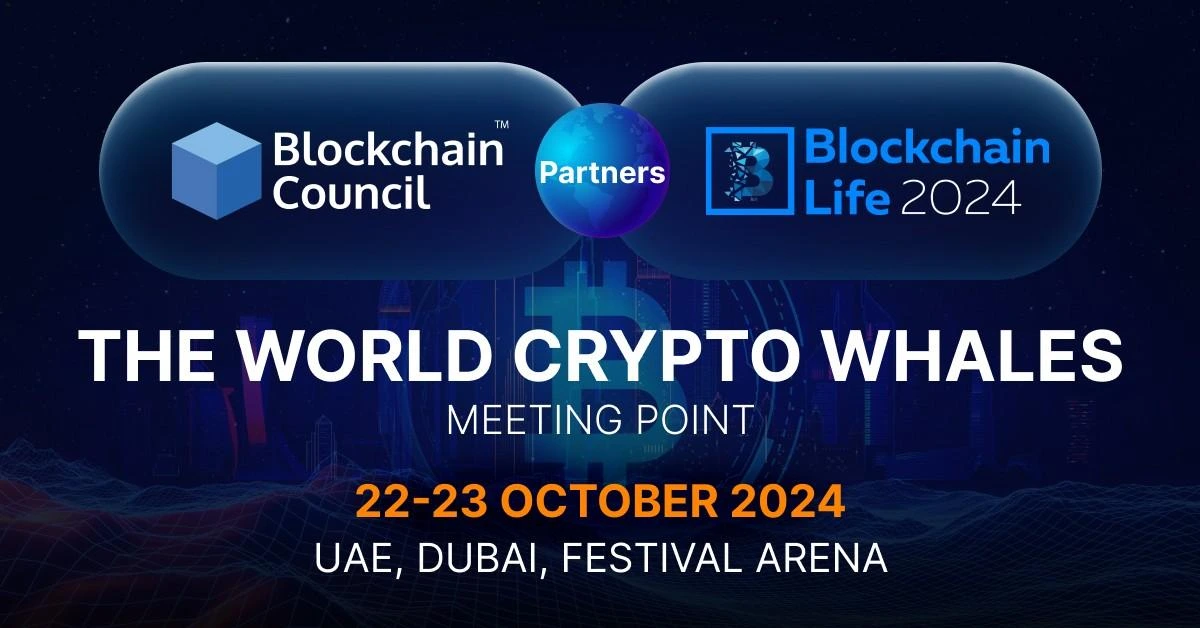
Blockchain Council Partners with Consensus Hong Kong 2025
Blockchain Council is excited to join Consensus Hong Kong 2025 as a Community Partner. This event is one of the biggest gatherings for Blockchain, digital

NFT is the abbreviated form of Non-Fungible Tokens. The term non-fungible refers to something with a unique value proposition that cannot be replaced by anything similar or the same. Here is a classy example to help you understand it better. Can a currency coin of a definite denomination be referred to as an NFT? The answer is simply no because though the value proposition is there, the coin holds some value when traded in the market. Therefore, its NFT cannot be developed as any other coin with similar monetary value can replace it. However, let’s consider that a “one dollar” note with code “xxxxxxx” was the first “one dollar” note released by the Central Bank of America. This note can be treated as a non-fungible physical asset since the code “xxxxxxx” is unique for this note, and any other one-dollar note cannot replace it.
The idea is interesting, isn’t it? And that’s the job of an NFT developer, to tokenize physical non-fungible assets into digital non-fungible tokens and help people, businesses, and organizations use them as digital assets. NFT developer is rising significantly as a popular career option in the last few months, especially in 2022 when NFTs became mainstream as several big names in the industry showed their confidence in this Blockchain-backed technology. This article will discuss and unfold everything you need to ace your preparation journey to become an NFT developer and work with top global brands looking for their chance to enter the NFT ecosystem.
Let’s get started.
NFTs are digital assets that use Blockchain technology to verify ownership and authenticity. The importance of NFTs in today’s world stems from their ability to solve several problems related to digital ownership and authentication and their potential to unlock new revenue streams and business models. They allow for unique and verifiable digital ownership of assets. This has significant implications for the art, music, and gaming industries, where creators have struggled to monetize their digital works and prevent unauthorized copies. With NFTs, creators can sell unique digital assets, and buyers can be assured of their authenticity and provenance.
NFTs can be programmed to execute certain actions when specific conditions are met, such as automatically distributing royalties to creators when their works are sold. Apart from that, NFTs have already been used to sell digital artworks for millions of dollars, and in the gaming world, they are being used to create unique in-game items and experiences. Furthermore, NFTs can be used to tokenize physical assets, such as real estate or luxury goods, allowing for fractional ownership and increased liquidity.
This is a glance at the immensely growing importance of non-fungible tokens with limitless use cases in business, marketing, advertising, gaming, and several others. 2022 brought NFTs on the front foot as crypto winter came, and investors worldwide were looking for an alternative investment. This shift of investors became one of the primary reasons behind the growth of this underrated Web3 technology. The industry suddenly fell short of NFT developers and created a surge in the requirement for professionals with expertise and experience in NFT development.
There is a high demand for the role of NFT experts, developers, and professionals who can help businesses from various sectors. The role and responsibilities vary depending on the product or service of the business/brand which is hiring.
However, we might help you with a generic explanation of the responsibilities associated with the role of NFT developers. In general, the role of an NFT developer is to create, deploy, and maintain non-fungible tokens (NFTs) on a Blockchain network. It requires the developer to be proficient in coding smart contracts using programming languages such as Solidity, which is used to develop decentralized applications on the Ethereum Blockchain. Further, an NFT developer has to design the NFT’s smart contract, which defines its unique attributes, such as ownership, transferability, and authenticity. The developer must also ensure that the NFT conforms to the standards and specifications of the Blockchain network on which it is deployed. In addition, the developer must test the NFT’s smart contract for security vulnerabilities and optimize its gas usage to minimize transaction fees.
As an NFT developer, you might also be asked to ensure that the NFT’s metadata is stored and accessible on a decentralized file storage system, such as IPFS, which stores the NFT’s image, description, and other relevant information. An NFT developer must also provide ongoing maintenance and support for the NFT, including updating its smart contract to fix bugs or add new features.
The role of an NFT developer is highly technical and requires expertise in Blockchain programming, smart contract development, and decentralized storage systems. Their responsibilities include completing tasks from designing, testing, deploying, and maintaining NFTs on a Blockchain network.
To get started, NFTs are a by-product of Blockchain technology that relies heavily on cryptography, hashing mechanisms, and different network security protocols to ensure immutable security and constant record-keeping of data transactions on the chain network. So, it becomes necessary to gain a complete or at least required understanding of Blockchain before delving into learning about NFTs. There are several ways of learning about NFTs and the different processes associated with NFT development and deployment. Below mentioned are some of the most popular ways to learn NFT development.
There are degree programs like a Bachelor of Technology where one can pursue degrees in computer science, software engineering, or a related field and take courses on Blockchain, NFT, smart contract development, and decentralized applications to gain a strong foundation in key Web3 technologies, including NFT development. But, there are a limited number of degree programs specifically tailored to NFT development, as NFTs are a relatively new technology. However, many universities have started offering courses on Blockchain development that cover NFTs as a part of the curriculum. But, these courses can only help college students. They can learn about designing and implementing secure systems resilient to cyber attacks, which is essential in NFTs.
While there are currently limited degree programs specifically focused on NFT development, students can still gain the necessary skills and knowledge to work with NFTs’ specialized Blockchain-related project development as a part of the degree curriculum. As the demand for NFTs and Blockchain technology continues to grow, more universities and educational institutions will likely offer programs specifically tailored to the industrial requirement.
Degree programs are not a perfect go-to learning resource for working professionals planning to switch to a career in growing Web3 technology. Various organizations offer NFT courses online and boot camps that offer in-depth training on NFT development and Blockchain technology. These programs provide a straightforward upskilling on in-demand skills and hands-on experience in building and deploying NFTs on Blockchain networks. These courses break down complex concepts into individual modules, making learning easier at your own pace and schedule.
For instance, you can check out Blockchain Council’s NFT Developer certification. This certification is designed by experts to equip you with all the necessary skills to shine as an NFT developer. It also comes with a lifetime valid certificate to boost your knowledge and credibility among potential employers. This specialized knowledge can be highly valuable in the job market, as employers often look for candidates with a deep understanding of specific technologies and their applications.
Here are some of the most important skills for an NFT developer:
Understanding hashing algorithms, public-key encryption, and digital signatures is crucial for ensuring the security of digital assets. In addition to the basic concepts of hashing algorithms, public-key encryption, and digital signatures, an NFT developer should be familiar with more advanced cryptography techniques such as zero-knowledge proofs, homomorphic encryption, and secure multiparty computation.
NFTs are based on Blockchain technology, so NFT developers need to deeply understand Blockchain networks, including distributed ledger technology, consensus algorithms, and smart contracts. One should have expertise in Blockchain networks such as Ethereum, Binance Smart Chain, and others, as well as knowledge of consensus algorithms such as Proof of Work, Proof of Stake, and Delegated Proof of Stake. They should also be able to create, deploy, and interact with smart contracts on these networks using programming languages like Solidity, Vyper, or Chaincode.
Smart contracts are self-executing programs that facilitate transactions on Blockchain networks, so an NFT developer must be skilled in writing and deploying smart contracts. They should be skilled in writing efficient, secure, and bug-free smart contracts. Additionally, an NFT developer should be familiar with common vulnerabilities such as reentrancy, integer overflow, and timestamp dependency and know how to use testing frameworks such as Truffle or Hardhat to test and deploy their smart contracts.
To build user interfaces for NFT applications, NFT developers should have expertise in web development technologies such as HTML, CSS, and JavaScript. NFT developers should be proficient in web development technologies such as React, Vue.js, or Angular, as well as an understanding of libraries and frameworks such as Web3.js, Ethers.js, or Metamask. They should also be skilled in developing use cases of web3 standards like ERC-721 and ERC-1155.
NFT marketplaces are a type of dApp, so NFT developers should have a solid understanding of decentralized application design and development. NFT developers should be able to design and develop decentralized applications that are secure, scalable, and user-friendly. They should be familiar with the architecture of dApps, as well as the different layers of the stack, such as the frontend, smart contract layer, and backend.
Knowledge of distributed systems is necessary for building and deploying NFTs on Blockchain networks, including understanding distributed consensus algorithms and peer-to-peer networks. NFT developers should understand distributed systems, including peer-to-peer networks, distributed ledgers, and consensus algorithms. They should also be able to design and implement distributed systems that are resilient, fault-tolerant, and can handle large amounts of traffic.
Understanding databases and data storage is important for managing the metadata and other relevant information about NFTs. NFT developers should be familiar with NoSQL databases, such as MongoDB, and distributed ledgers, such as IPFS, to store and manage the metadata and other relevant information about NFTs. They should also be able to optimize the performance of databases and use tools such as Infura or Alchemy to interact with the Blockchain network.
NFTs are gaining popularity across various industries, and as a result, there is an increasing demand for skilled NFT developers. Here are some sectors that are looking for NFT developers:
NFTs have revolutionized the way we think about digital art, enabling artists to create unique, verifiable, and valuable digital works that can be bought and sold on the Blockchain. Many artists, galleries, and collectors are now looking for NFT developers to help them create and sell their works.
NFTs are becoming an essential part of the gaming industry, enabling players to buy, sell, and trade unique digital assets such as skins, weapons, and characters. NFT developers can help integrate NFTs into their games, creating a new revenue stream and increasing player engagement.
NFTs have the potential to disrupt the music industry by enabling artists to sell their music as unique, verifiable digital assets. Many musicians are now exploring NFTs as a new way to monetize their work and are seeking the help of NFT developers to create and sell their music on the Blockchain.
NFTs can also revolutionize real estate by enabling property owners to sell their assets as digital tokens on the Blockchain. NFT developers can help real estate developers create and sell NFTs representing ownership rights, allowing the investors to buy and sell a property without intermediaries.
NFTs are used in ticketing systems to create unique digital tickets that cannot be duplicated, ensuring that each ticket is verifiable and secure. This allows event organizers to sell tickets directly to their fans and prevent scalping, enabling fans to easily transfer or resell their tickets without the risk of fraud.
Choosing a career as an NFT developer can be highly rewarding. The demand for skilled NFT developers is growing rapidly, and this trend is likely to continue as more industries adopt Blockchain technology. NFT developers can earn attractive salaries and work on cutting-edge projects that have the potential to change the way we think about ownership, value, and identity in the digital world. By mastering key technical skills such as cryptography, smart contracts, web development, and distributed systems, aspiring NFT developers can gain a competitive edge in the job market and work on cutting-edge projects that have the potential to change the way we think about ownership, value, and identity in the digital world. So if you’re passionate about Blockchain technology and want to build a career in an emerging field with great potential, NFT development is worth exploring.

Blockchain Council is excited to join Consensus Hong Kong 2025 as a Community Partner. This event is one of the biggest gatherings for Blockchain, digital

Blockchain Council is excited to share that it will be the Community Partner for Consensus Hong Kong 2025, an event widely regarded as one of

Blockchain technology is bringing fresh perspectives to how people engage with digital tools. It’s opening new doors for industries, creating possibilities, and uplifting communities. With

The Blockchain Council is thrilled to announce its media partnership with Blockchain Life 2024, one of the key events in the Blockchain and cryptocurrency space.

Blockchain Council is excited to announce its official media partnership with Blockchain Life 2024, the premier blockchain and cryptocurrency event of the year. Scheduled to
Yes, anyone can become an NFT creator if they have the necessary skills and tools to create unique and valuable digital content.
To start an NFT career, you must have some digital art or other digital content to sell as an NFT. You can then create an account on an NFT marketplace, such as OpenSea or Rarible, and begin listing your NFTs for sale.
The amount of money an NFT creator makes depends on the popularity and value of their NFTs. Some NFTs have sold millions of dollars, while others sell for much less. It is also important to consider the fees associated with selling NFTs, such as gas and marketplace fees.
Whether or not NFT development is a good career depends on various factors, such as the demand for NFTs and the individual’s skills and ability to create valuable and unique digital content. The NFT market is relatively new and still evolving, so it is difficult to predict its long-term viability as a career path.
Welcome to the Blockchain Council, a collective of forward-thinking Blockchain and Deep Tech enthusiasts dedicated to advancing research, development, and practical applications of Blockchain, AI, and Web3 technologies. Our mission is to foster a collaborative environment where experts from diverse disciplines share their knowledge and promote varied use cases for a technologically advanced world.
Blockchain Council is a private de-facto organization of experts and enthusiasts championing advancements in Blockchain, AI, and Web3 Technologies. To enhance our community’s learning, we conduct frequent webinars, training sessions, seminars, and events and offer certification programs.
To receive Offers & Newsletters
60,000+ Professionals Certified so far by Blockchain Council

Coupon
expires in
Enroll today in any of the popular certifications curated as per the Industry trends.
